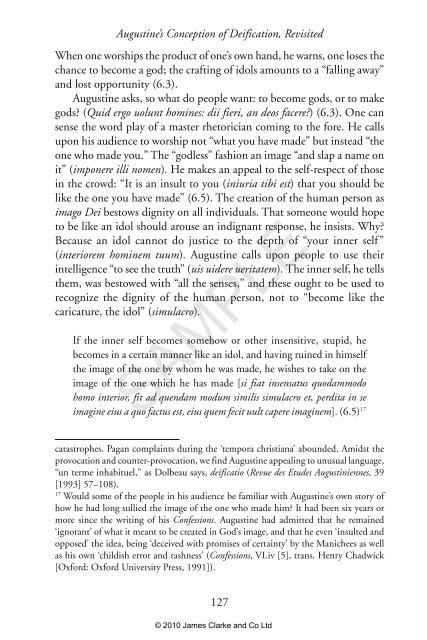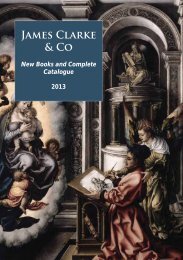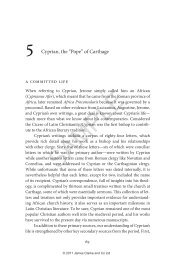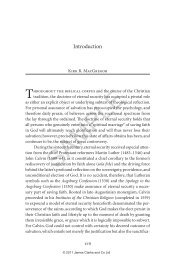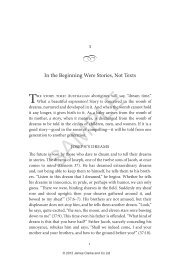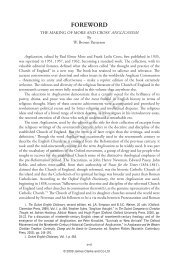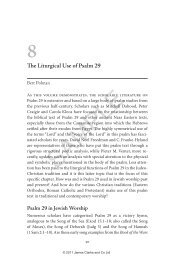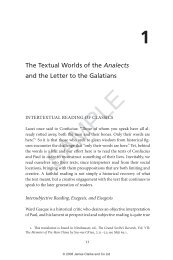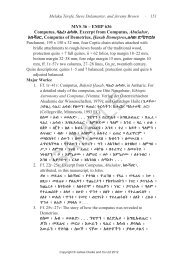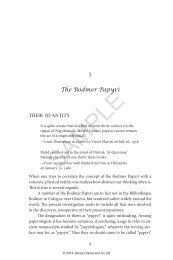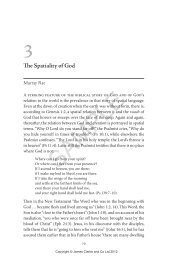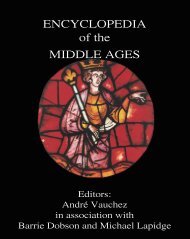Augustine's Conception of Deification, Revisited - James Clarke and ...
Augustine's Conception of Deification, Revisited - James Clarke and ...
Augustine's Conception of Deification, Revisited - James Clarke and ...
Create successful ePaper yourself
Turn your PDF publications into a flip-book with our unique Google optimized e-Paper software.
Augustine’s <strong>Conception</strong> <strong>of</strong> <strong>Deification</strong>, <strong>Revisited</strong><br />
When one worships the product <strong>of</strong> one’s own h<strong>and</strong>, he warns, one loses the<br />
chance to become a god; the crafting <strong>of</strong> idols amounts to a “falling away”<br />
<strong>and</strong> lost opportunity (6.3).<br />
Augustine asks, so what do people want: to become gods, or to make<br />
gods? (Quid ergo uolunt homines: dii fieri, an deos facere?) (6.3). One can<br />
sense the word play <strong>of</strong> a master rhetorician coming to the fore. He calls<br />
upon his audience to worship not “what you have made” but instead “the<br />
one who made you.” The “godless” fashion an image “<strong>and</strong> slap a name on<br />
it” (imponere illi nomen). He makes an appeal to the self-respect <strong>of</strong> those<br />
in the crowd: “It is an insult to you (iniuria tibi est) that you should be<br />
like the one you have made” (6.5). The creation <strong>of</strong> the human person as<br />
imago Dei bestows dignity on all individuals. That someone would hope<br />
to be like an idol should arouse an indignant response, he insists. Why?<br />
Because an idol cannot do justice to the depth <strong>of</strong> “your inner self”<br />
(interiorem hominem tuum). Augustine calls upon people to use their<br />
intelligence “to see the truth” (uis uidere ueritatem). The inner self, he tells<br />
them, was bestowed with “all the senses,” <strong>and</strong> these ought to be used to<br />
recognize the dignity <strong>of</strong> the human person, not to “become like the<br />
caricature, the idol” (simulacro).<br />
If the inner self becomes somehow or other insensitive, stupid, he<br />
becomes in a certain manner like an idol, <strong>and</strong> having ruined in himself<br />
the image <strong>of</strong> the one by whom he was made, he wishes to take on the<br />
image <strong>of</strong> the one which he has made [si fiat insensatus quodammodo<br />
homo interior, fit ad quendam modum similis simulacro et, perdita in se<br />
imagine eius a quo factus est, eius quem fecit uult capere imaginem]. (6.5) 17<br />
SAMPLE<br />
catastrophes. Pagan complaints during the ‘tempora christiana’ abounded. Amidst the<br />
provocation <strong>and</strong> counter-provocation, we find Augustine appealing to unusual language,<br />
“un terme inhabituel,” as Dolbeau says, deificatio (Revue des Etudes Augustiniennes, 39<br />
[1993] 57–108).<br />
17<br />
Would some <strong>of</strong> the people in his audience be familiar with Augustine’s own story <strong>of</strong><br />
how he had long sullied the image <strong>of</strong> the one who made him? It had been six years or<br />
more since the writing <strong>of</strong> his Confessions. Augustine had admitted that he remained<br />
‘ignorant’ <strong>of</strong> what it meant to be created in God’s image, <strong>and</strong> that he even ‘insulted <strong>and</strong><br />
opposed’ the idea, being ‘deceived with promises <strong>of</strong> certainty’ by the Manichees as well<br />
as his own ‘childish error <strong>and</strong> rashness’ (Confessions, VI.iv [5], trans. Henry Chadwick<br />
[Oxford: Oxford University Press, 1991]).<br />
127<br />
© 2010 <strong>James</strong> <strong>Clarke</strong> <strong>and</strong> Co Ltd


